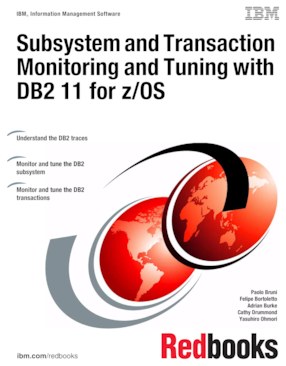About cookies on this site Our websites require some cookies to function properly (required). In addition, other cookies may be used with your consent to analyze site usage, improve the user experience and for advertising. For more information, please review your options. By visiting our website, you agree to our processing of information as described in IBM’sprivacy statement. To provide a smooth navigation, your cookie preferences will be shared across the IBM web domains listed here.

Published on 28 February 2014, updated 31 August 2022
Read in Google Books Order hardcopy
Share this page:
ISBN-10: 0738439126
ISBN-13: 9780738439129
IBM Form #: SG24-8182-00
Authors: Paolo Bruni, Felipe Bortoletto, Adrian Burke, Cathy Drummond and Yasuhiro Ohmori
Abstract
This IBM® Redbooks® publication discusses in detail the facilities of DB2® for z/OS®, which allow complete monitoring of a DB2 environment. It focuses on the use of the DB2 instrumentation facility component (IFC) to provide monitoring of DB2 data and events and includes suggestions for related tuning.
We discuss the collection of statistics for the verification of performance of the various components of the DB2 system and accounting for tracking the behavior of the applications.
We have intentionally omitted considerations for query optimization; they are worth a separate document.
Use this book to activate the right traces to help you monitor the performance of your DB2 system and to tune the various aspects of subsystem and application performance.
Table of Contents
Part 1. Introduction to DB2 monitoring
Chapter 1. Introduction to monitoring and tuning
Chapter 2. DB2 traces
Chapter 3. System z related information
Part 2. Subsystem monitoring
Chapter 4. System address space CPU time
Chapter 5. EDM pools
Chapter 6. Data set open and close
Chapter 7. Log activity
Chapter 8. IRLM, locking, and latching
Chapter 9. The zIIP engine and DB2
Chapter 10. Buffer pools and group buffer pools
Chapter 11. DDF activity
Chapter 12. Workfiles, RID, and sort pools
Chapter 13. Virtual and real storage
Part 3. Transaction monitoring
Chapter 14. Accounting trace overview
Chapter 15. Analyzing accounting data: CPU and suspension time
Chapter 16. I/O suspensions
Chapter 17. Locking, latching, and buffer pool accounting counters
Chapter 18. Service task suspension
Chapter 19. Stored procedures, user defined functions, and triggers
Chapter 20. DRDA, parallelism, and statement cache
Appendix A. Production modeling
Appendix B. IBM OMEGAMON XE for DB2 performance database